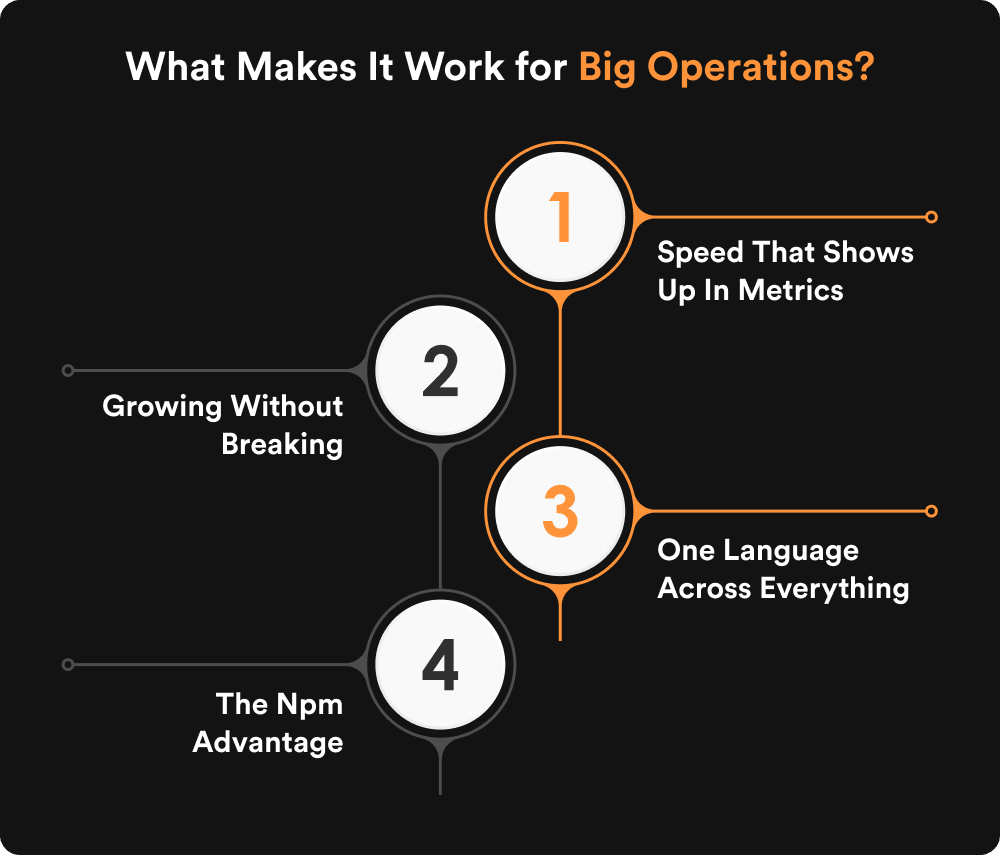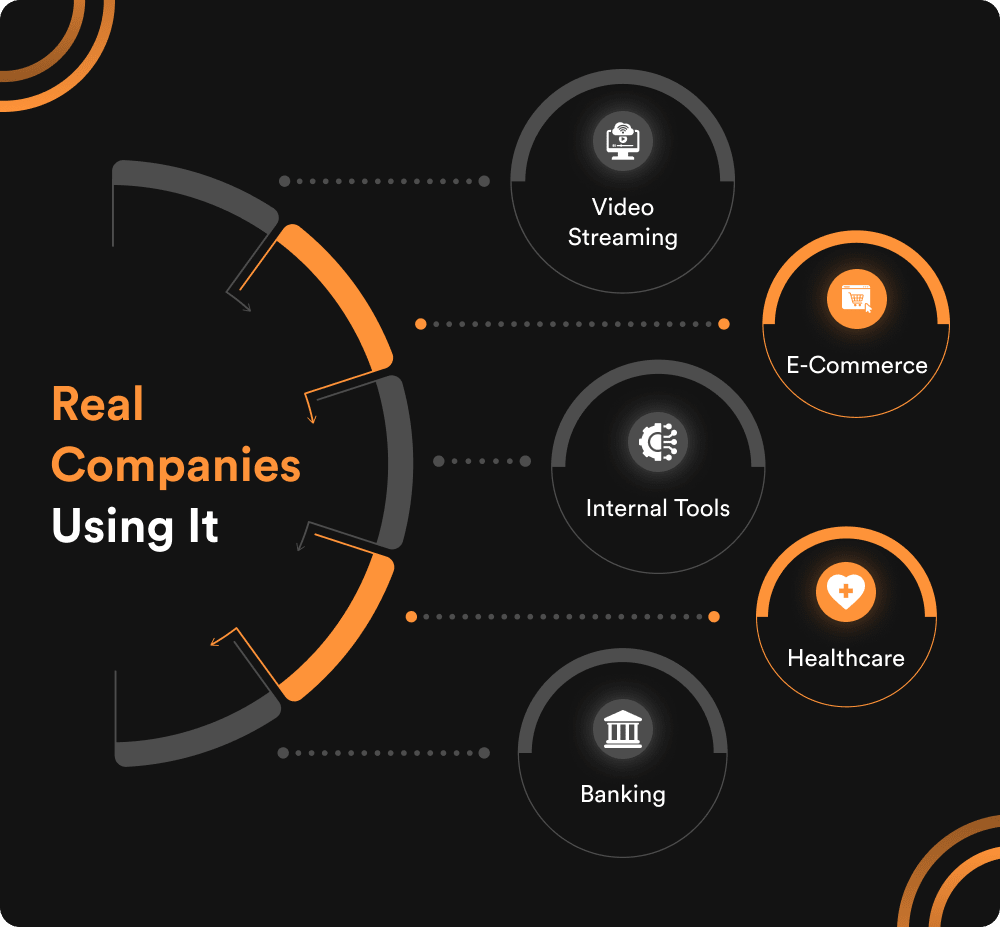
Introduction to Node.js for Enterprise Web Apps
Enterprise applications face brutal demands today. Thousands of users hit servers at once. Pages need to load in under two seconds. One crash during business hours can cost millions.
Node.js keeps showing up in the tech stacks of companies that can’t afford mistakes. Netflix runs its streaming on it. PayPal rewrote its checkout system with it. LinkedIn powers its mobile experience through it. That’s the same engine that makes the Chrome browser so fast.
When you bring that speed to server-side operations, response times drop dramatically. Most companies trying Node.js for the first time hit roadblocks. The learning curve exists. That’s why bringing in a web app development company often makes the difference between a smooth launch and months of debugging.
What’s Node.js?
JavaScript used to live only in browsers. Node.js changed that by letting JavaScript run on servers.
Think about how traditional servers handle requests. Someone visits a webpage. The server gets user data from the database. Then it checks permissions. Then it loads images. Then it fetches content. Each step waits for the previous one to complete.
Node.js throws out that waiting game. It fires off all those requests at once. Results come back in whatever order they finish. The server assembles everything and sends the complete page.
Companies running Node.js need less hardware to handle the same traffic. AWS bills go down. Performance goes up.
What Makes It Work for Big Operations?

Speed That Shows Up in Metrics
V8 compiles JavaScript into actual machine code. No interpreter sitting in the middle, slowing things down.
PayPal tracked a 35% speed improvement after their migration. Their servers processed the same transaction volume using fewer resources when you’re handling millions of payments daily, that efficiency compounds.
Growing Without Breaking
Microservices architecture fits Node.js perfectly. Different parts of an application scale independently based on what’s getting hammered.
Netflix faces massive traffic spikes when popular shows drop new episodes. Everyone tries to stream at once. Their Node.js infrastructure spins up additional instances automatically where needed. No one manually provisions servers at 3 AM.
One Language Across Everything
Frontend developers know JavaScript. Backend developers know JavaScript. The mobile team knows JavaScript. Code reviews happen faster because everyone reads the same language.
Bugs that cross the frontend-backend boundary get caught earlier. New team members contribute sooner because they’re not learning a completely different backend language. Features ship without waiting for translation between team specialties.
The npm Advantage
Over a million packages exist in the npm registry. Authentication libraries that millions of apps already use. Payment processing modules tested in production. Real-time chat components ready to drop in.
Development teams skip rebuilding basic functionality. They grab proven solutions and focus energy on whatever makes their product unique. Time to market shrinks considerably.
How It Compares
Factor | Node.js | Java | .NET |
Concurrent connections | Handles thousands easily | Struggles without tuning | Decent performance |
Real-time features | Native support | Requires frameworks | Needs extra work |
Learning difficulty | Low for JS developers | High | Medium |
Server requirements | Minimal | Heavy | Moderate |
Development speed | Fast iteration | Slower cycles | Middle pace |
Java has dominated enterprise development for decades. .NET owns the Microsoft ecosystem. Both remain solid choices for specific scenarios. But real-time applications and rapid app development cycles favor Node.js heavily.
Real Companies Using It

E-commerce
Walmart rebuilt its online platform with Node.js. Black Friday no longer terrifies their ops team. The system handles traffic surges that would have crashed their old setup.
Banking
Capital One runs customer-facing apps on Node.js. Balance checks return instantly. The money transfer process is in real-time. The fraud detection system analyzes transactions as they happen.
Healthcare
Medical systems can’t tolerate delays. Lab results need to appear immediately when ready. Appointment scheduling across multiple facilities has to prevent conflicts. Patient records must stay current everywhere. Node.js handles these requirements naturally.
Internal Tools
Trello built its entire backend on Node.js. When someone moves a card on a shared board, everyone sees it move immediately. No refresh button. No delay. The system pushes updates to all connected clients the moment changes happen.
Video Streaming
Netflix serves over 200 million subscribers. Billions of streaming hours monthly. The system adjusts video quality dynamically based on connection speed. Multiple family members can watch different shows simultaneously. All of this runs on Node.js.
Getting Implementation Right
Powerful tools in inexperienced hands create expensive problems. Node.js projects fail regularly, usually from preventable mistakes.
Architecture Matters Early
A well-architected system adds features smoothly. Poor structure requires constant refactoring just to maintain existing functionality.
Database schema design impacts performance for years. API structure determines how easily mobile apps can integrate. Security implementations done wrong expose vulnerabilities that attackers find quickly.
Security Can’t Be Bolted On Later
Enterprise applications handle sensitive information. Customer data. Payment details. Business secrets.
Professional web app development services know where vulnerabilities typically hide in Node.js applications. They implement proper authentication from day one.
Integration Gets Complicated
Most enterprises aren’t building on empty ground. New systems need to work with existing databases. They connect to legacy APIs. They integrate with third-party services. They fit into established workflows. This integration work requires experience.
Performance Needs Tuning
Node.js runs fast by default, but enterprise-scale demands optimisation. Database queries need proper indexing. Caching strategies require thought. Load balancers need configuration. Memory leaks need prevention.
A web app development company with Node.js experience has already solved these problems.
🎧 Podcast: How Node.js Keeps Enterprise Systems Fast, Secure, and Scalable

Expert practitioners share proven patterns, operational safeguards, and observability practices enterprises use to keep production services fast, compliant, and highly available.
🎙 Listen in and make a confident decision for your next project.
Key Takeaways
Node.js crossed from experimental to mainstream years ago. Companies betting their business on it keep growing that list.
Frequently Asked Questions (FAQs)
Modern web applications need real-time features and fast iteration. Node.js handles both naturally. The JavaScript everywhere approach speeds up development and reduces miscommunication between frontend and backend teams.
Major platforms prove it daily. Netflix, LinkedIn, PayPal, Uber, and thousands of other large companies run production systems on Node.js. The architecture scales horizontally, which means adding capacity is straightforward.
The non-blocking model efficiently processes thousands of simultaneous connections. Traditional thread-based systems can become slow as the number of connections increases. Node.js maintains consistent performance because it doesn’t create new threads for each connection.
Node.js connects to all major databases—MySQL, PostgreSQL, MongoDB, Oracle, and SQL Server. It integrates with enterprise message queues, authentication systems, and legacy APIs. Most companies run Node.js alongside existing infrastructure without replacing everything.
Internal teams can definitely learn Node.js. But specialists who’ve built similar systems deliver faster results with fewer mistakes. They know common pitfalls. They’ve optimized database queries before. They understand deployment best practices. For time-sensitive projects, that experience matters.










